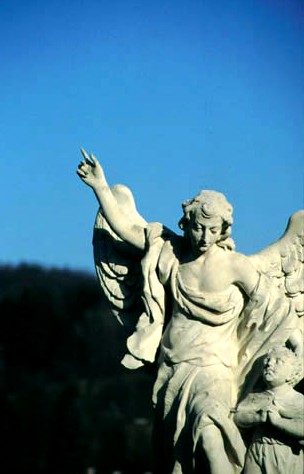

Chaplins assist those nearing end. It (death) is really not an end of life, but a beginning.
 |
 |
|
April 10, 2004 - Reported in the [Tyler Morning Telegraph]. In some ways, Easter at Hospice of East Texas is like any other day. On the other hand, days at Hospice are very out of the ordinary. Passing from one world to the next is what Easter, and Hospice, are all about. When it comes to death, transition or "passing," the chaplains at Hospice of East Texas are there to assist, to support, or to simply be a silent presence. Many times they also observe how people leave this world, and they say their reflections have led them to a deeper meaning of Easter. "The end of this life is not a time to give up hope," said Chaplain Dennis Harvey, a 10-year Hospice veteran. "We want to encourage life and see to it our patients live to the fullest. We hold out the hope for those who have the faith that God can move and do things at any time. There is never a time to say the situation is hopeless even if you're very close to the end." Entire families grasp that concept, he said. "It (death) is really not an end of life, but a beginning of a new one for those who have faith," Harvey said, "and so often families are able to see that transition (for themselves) as their relatives begin to pass." The passing becomes very meaningful, he said. "It is one of those fabulous times to be with the patient as they begin to actually see loved ones (who have previously died) waiting for them. They are not hallucinating but are in those last stages, flowing in and out of this world. They're seeing things, I believe wholeheartedly, that are there.In that limbo, they're starting to get a glimpse of that next life. It's a very natural, natural part of the process as they begin to make that transition. Life's not ending, it's moving to another realm." The chaplains' job, Harvey said, is to support and assist the patients, regardless of their faith or lack thereof. "If I'm asked about what I believe, then I won't shy away from it," he said. "People have all kinds of questions." The chapel at Hospice has a book that residents write in for prayer requests. There are various religious symbols available at the chapel for people of different faiths. Brian Porr, the in-house chaplain, checks the book daily for the written requests and visits he will make. Porr, who has been with Hospice for 16 months, describes it as "the best job I ever had," and "a calling - more than just work." "It reinforces my faith when I see the way some people pass," Porr said. "It is not uncommon to hear them say that they see loved ones who have passed before them, or reach out because they see someone reaching out to them." He said he has a strong response when he sees that. "I just say 'Thank God that he is there for us' when that happens," he said. "When I see someone reaching for heaven and speaking the name of some who have passed before, or God, it just reaffirms my faith. I can't see beyond, and I don't know what they can see at the point, but they are seeing something." Easter 'Depth' Easter becomes the 'background fabric' for the final transition of life, they said. "Obviously Easter brings deeper awareness, that this is the basis for all our hope," Harvey said, "especially for those who are sitting right here on the doorstep of eternal life with life-and-death issues. The season brings about the assurance of hope, promise and realization that we're putting our faith, in a very real sense, on the line." And Porr, too, has heard the stories from his patients. "I've the privilege to speak to three or four people who have had near-death experiences who have come back," he said. "They relate that they visited a place of incredible peace, calm and beauty. They wanted to stay but were told they had to come back." One incident in particular, at another hospital where he worked, stands out. "A woman (was passing) and saw a very old man in very white robes who just emitted light. She said it felt so warm and comforting and he told her she would be back but first she had to return to earth.She had been in a coma for three days and doctors said she would never wake up," he said. But she did. "She came out of it, and she shared that story," he said. "It makes you stop and think. You can't take things for granted when you hear things like that. It's a 'whoa' experience." Both Harvey and Porr said being at Hospice makes the depth of the Easter observance hit home. "The work here makes you center on what is really important about Easter," Harvey said. "You realize how important the resurrection really is and the magnitude of the birth and resurrection of Christ. You center on meaning of Easter and what is truly important. Everything else around it, like Easter egg hunts, fall aside as trivial." Harvey said he has been present countless times as people have passed away in his 10 years at Hospice. "One time a lady (about to 'pass') saw the child she had miscarried years ago, waiting for her and her son, who had died previously. They hollered out to her that it was OK, that it was them and they were waiting for her, but it was not her time yet.She didn't die, and it was about three weeks later she passed.' Those (kinds of) experiences are very common," Harvey said, "for people to see and talk to loved ones." Another time there was a young child in transition. "He didn't speak for a long time," Harvey said. "All of a sudden he opened his eyes and said to his mother, 'They're here for me. I love you,' and those were his last words. We assumed there were angels coming for him, and the mother was very comforted by it." Another time, a patient already knew that close friends had died. "One family came to visit their mother and she said, 'How come you didn't tell me sister so-and-so had died? She came to see me last night and told me she was fine and that I would see her soon.'" Those are confirmations to Harvey. "I think it's a tremendous affirmation that God is active," he said. "God is here and we don't understand the whys or the things that happen, but that there is definitely a God, eternal life is real and it reassures that point of faith." The Precious Present There are countless other examples, he said. "As hard as this is to go through this time of coming separation," Harvey said, "to have the reassurance, the promise that this is not the end and we will be together again because of Easter, is a great comfort to many families." It is not a time to sit back and wait for the end, he said. "If there are things to do, families to see, relationships to rebuild, things needed to be said to each other that you want to say and clarify issues, there is still time," he said. "We try to get that done." The whole process can actually be hopeful, Porr said. "The entire experience depends on a person's outlook," he said. "In my experience, people who have faith to back them up have an easier time of it than those who don't. The same goes for the family members." "The people I've gotten to know what their most important thoughts are, their deepest secrets they've shared with me, have made working these last 10 years with Hospice tremendously rewarding," Harvey said. "Yes, it's sad, too, but our focus is on the here and now. We don't talk in terms of planning for the future because the present is the most precious." "Death recognizes no holidays," Porr said, "and God knows what it's like to sit in vigil for a relative who's dying. In a sense it's always Easter around here because it's all about passing and what happens next." |